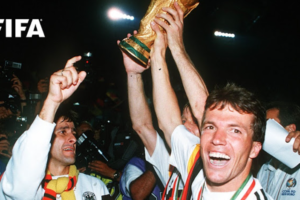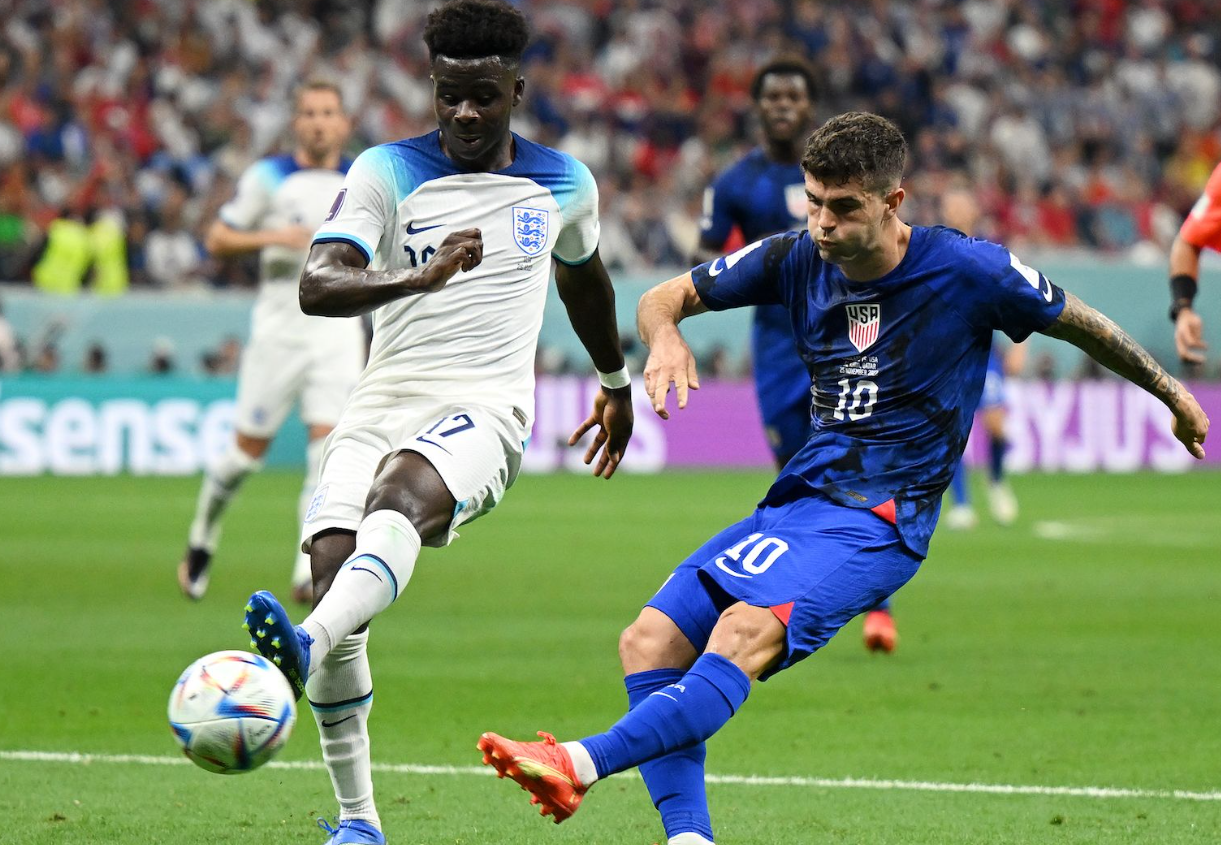The 1990 FIFA World Cup, held in Italy, was a monumental event that captivated the hearts and minds of football fans around the globe. With its rich history and passionate supporters, Italy proved to be the perfect stage for this grand tournament.
The excitement surrounding the World Cup was palpable, as teams from all over the world gathered to showcase their skills and compete for the prestigious trophy. The stadiums were filled to the brim with enthusiastic spectators, waving their flags and cheering for their favorite teams.
The matches were intense, with players showcasing their incredible talent and determination on the field. The competition was fierce, as every team fought tooth and nail for victory. Goals were scored, saves were made, and legends were born.
The Italian landscape provided a picturesque backdrop for the tournament, with its beautiful cities and iconic landmarks. Football fans from all nations had the opportunity to explore the country’s rich culture and history, immersing themselves in the vibrant atmosphere that Italy had to offer.
Off the field, the World Cup brought people from different backgrounds together, fostering a sense of unity and camaraderie. Fans from different countries mingled, sharing their love for the sport and forging lasting friendships. The World Cup became a celebration of diversity and the power of sports to bring people together.
In the end, it was West Germany who emerged victorious, defeating Argentina in the final match. The crowd erupted in jubilation as the winning goal was scored, marking the culmination of a month-long spectacle of skill, passion, and unwavering dedication.
The 1990 FIFA World Cup in Italy will forever be etched in football history as a testament to the sport’s ability to unite nations and create unforgettable moments. It was a tournament that showcased the best of what football has to offer, leaving an indelible mark on the hearts of fans worldwide.

2002 FIFA World Cup (South Korea/Japan)
The 2002 FIFA World Cup, jointly hosted by South Korea and Japan, remains one of the most memorable tournaments in the history of football. This grand event witnessed teams from across the globe showcasing their skills, passion, and determination on the field. Held from May 31st to June 30th, the tournament left an indelible mark on the hearts of millions of football enthusiasts worldwide.
South Korea and Japan, two nations deeply rooted in their love for the game, joined forces to successfully organize a World Cup that would forever be etched in the annals of football history. This was the first time that the tournament was co-hosted by two countries, which presented its own unique set of challenges. However, both nations rose to the occasion, demonstrating their commitment to the sport and their ability to overcome any obstacles.
The tournament showcased the rich cultural heritage of South Korea and Japan, as fans from all over the world flocked to the stadiums to witness the magic unfold before their eyes. The passion exhibited by the local fans was infectious, creating an electrifying atmosphere that reverberated throughout the matches. The vibrant colors, chants, and dances in the stands added an extra dimension to the World Cup experience, making it an unforgettable spectacle.
The 2002 FIFA World Cup witnessed several surprising moments that left fans awestruck. South Korea, as the host nation, exceeded all expectations by reaching the semi-finals, an achievement that had never been accomplished by an Asian team before. Their journey was filled with nail-biting encounters, including a memorable victory against Italy in the Round of 16, which ended in a penalty shootout. This incredible run united the nation, instilling a sense of pride and joy in the hearts of every South Korean.
Japan, too, left an indelible mark on the tournament. They demonstrated their prowess on the field, advancing to the Round of 16, where they were defeated by Turkey in a thrilling match. The Japanese team’s performance captivated the nation and ignited a newfound passion for football, inspiring a generation of young players to pursue their dreams.
The tournament also witnessed breathtaking displays of skill and talent from some of the world’s greatest footballing legends. The likes of Ronaldo, Oliver Kahn, Ronaldinho, and Hidetoshi Nakata dazzled audiences with their exceptional abilities, leaving fans in awe. The sheer talent on display throughout the tournament elevated the level of competition, making it a feast for football enthusiasts.
The 2002 FIFA World Cup exemplified the power of sport to foster unity and promote cultural exchange. The tournament brought together people from diverse backgrounds, transcending cultural barriers and promoting a spirit of camaraderie. The joyous celebrations, embraces, and shared experiences created lasting bonds among fans, players, and nations alike.
In conclusion, the 2002 FIFA World Cup in South Korea and Japan will forever be remembered as a milestone in the history of football. It showcased the passion, skill, and unity of nations, leaving an indelible mark on the hearts of millions. The tournament’s success exemplified the power of sport to unite people and promote cultural exchange, making it a true celebration of the beautiful game.
2006 FIFA World Cup (Germany)
The 2006 FIFA World Cup held in Germany was a monumental event that captivated the world with its electrifying matches, passionate supporters, and the spirit of unity it brought to the host nation. From the moment the tournament kicked off, it became clear that this edition would be one for the history books.
Germany, known for its rich football culture, embraced the opportunity to host the World Cup with open arms. The country’s impeccable organization and infrastructure ensured that fans and teams alike had an unforgettable experience. The event took place in various cities across Germany, with each venue showcasing the nation’s unique identity and heritage.
The tournament itself was marked by intense competition and spectacular football. The world’s top teams gathered to battle it out for the prestigious trophy, with players from all corners of the globe showcasing their skills. The matches were filled with drama, as underdogs defied expectations and traditional powerhouses fought tooth and nail to assert their dominance.
One of the most memorable aspects of the 2006 World Cup was the incredible atmosphere created by the fans. German supporters, renowned for their passion and loyalty, came out in full force to cheer on their national team. The streets were adorned with flags, and stadiums reverberated with chants and cheers. The sight of thousands of fans donning their team’s colors and coming together in a celebration of football was truly awe-inspiring.
The tournament also left an indelible mark on the German national team. Led by coach Jürgen Klinsmann, the German squad displayed a remarkable level of cohesion, skill, and determination. They captivated the nation with their attacking style of play and their refusal to back down in the face of adversity. In a stunning display of their abilities, the German team reached the semi-finals, bringing joy and pride to their fans.
While the football itself took center stage, the 2006 World Cup was also notable for its focus on promoting social integration and cultural exchange. The Fan Fests, organized in each host city, provided a platform for people from all walks of life to come together and celebrate their love for the game. These events fostered a sense of unity and camaraderie among diverse communities, reinforcing the power of football as a universal language.
Moreover, the World Cup also had a significant economic impact on Germany. The influx of visitors from around the world stimulated local businesses, hotels, and restaurants, providing a boost to the national economy. The tournament showcased Germany’s ability to host large-scale events and attract international tourists, solidifying its position as a global destination.
Perhaps the most iconic moment of the 2006 World Cup came during the final match between Italy and France. In a thrilling contest, the two teams battled it out for glory. The match will forever be remembered for the dramatic headbutt by French captain Zinedine Zidane, which led to his expulsion from the game. Ultimately, Italy emerged victorious, securing their fourth World Cup title in a penalty shootout.
The 2006 FIFA World Cup in Germany was a resounding success that left an enduring legacy. It showcased the power of football to bring people together, transcending borders and cultural differences. The tournament will forever be remembered for its incredible football, passionate supporters, and the vibrant spirit it brought to the host nation. Germany’s ability to host such a remarkable event further solidified its reputation as a nation deeply rooted in football history.

2014 FIFA World Cup (Brazil)
The 2014 FIFA World Cup held in Brazil was a momentous event that captivated the hearts and minds of millions around the globe. With its vibrant culture, passionate fans, and exceptional football teams, Brazil proved to be the perfect host for this prestigious tournament.
From the moment the opening ceremony began, the world was in awe of the sheer spectacle that unfolded before their eyes. The colorful costumes, rhythmic dances, and lively music showcased Brazil’s rich heritage and cultural diversity. It was a true celebration of the country’s identity and a warm welcome to the world.
The matches themselves were nothing short of exhilarating. As the world’s top football teams clashed on the field, the atmosphere in the stadiums became electric. The roar of the crowd, the deafening chants, and the thunderous applause kept the adrenaline pumping throughout each game. Every goal scored was met with euphoria, and every near miss left spectators breathless with anticipation.
One of the most memorable aspects of the 2014 World Cup was the incredible performances of the teams. From the samba flair of Brazil to the technical brilliance of Germany, each nation brought their unique style to the tournament. The skills displayed on the field were a testament to the countless hours of training and dedication that these athletes had put in to reach this pinnacle of their careers.
As the tournament progressed, it became evident that Brazil’s love for football ran deeper than just the sport itself. The fans, known as “torcedores,” were the heartbeat of the World Cup. They filled the stadiums with their infectious energy, colorful attire, and passionate chants. The camaraderie among supporters from different nations was heartwarming to witness, as fans united in their shared love for the beautiful game.
Beyond the matches, the World Cup also left a lasting legacy on Brazil. The tournament provided an opportunity for the country to showcase its infrastructure and hospitality to the world. The newly built stadiums, improved transportation systems, and enhanced tourist facilities were a testament to Brazil’s commitment to hosting a successful event. These developments left a positive and lasting impact on the country’s tourism industry and overall economy.
However, the 2014 World Cup was not without its controversies. Protests and demonstrations took place across Brazil, with some expressing discontent over the high costs associated with hosting the tournament. Many believed that the funds could have been better utilized to address social issues such as poverty, education, and healthcare. These protests served as a reminder that the World Cup was not just a sporting event but also a platform for societal discussions and debates.
In the end, the 2014 FIFA World Cup in Brazil will be remembered as a truly remarkable event. It showcased the best of football, brought people together from all walks of life, and left an indelible mark on the host nation. The tournament highlighted Brazil’s passion for the sport, its rich cultural heritage, and its ability to host a world-class event. It was a celebration of unity, diversity, and the universal language of football that resonated with millions worldwide.











